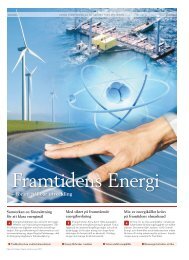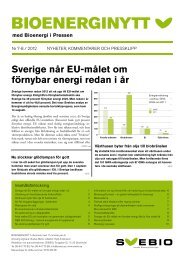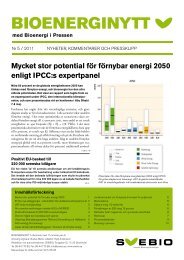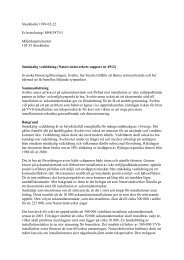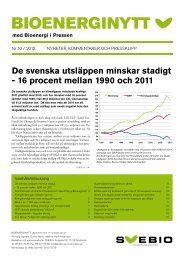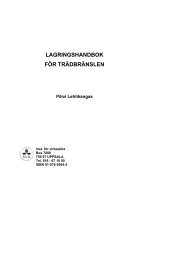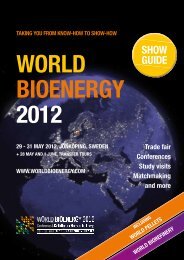Proceedings World Bioenergy 2010
Proceedings World Bioenergy 2010
Proceedings World Bioenergy 2010
Create successful ePaper yourself
Turn your PDF publications into a flip-book with our unique Google optimized e-Paper software.
issues in the municipalities. The factors selected most<br />
often were employment, use of natural resources and<br />
climate change. The received answers gave a good<br />
picture and guidelines on how to collect more detailed<br />
and specific information in the future. The main<br />
conclusions from the survey can be found in the<br />
following sections.<br />
4.1 Optimism or not at the region<br />
Decision makers were asked to describe the<br />
atmosphere for renewable energy in their<br />
working/residential areas. There has been a positive<br />
change in attitudes in last years. There is also a<br />
willingness to act but, on the other hand, there is a lack of<br />
actions. Renewable energy sources are considered as a<br />
possibility. On the other hand, “I feel that” –way of<br />
thinking can be still seen.<br />
The received information was also experienced<br />
insufficient and some of the respondents had negative<br />
experiences. Also the concepts used by decision makers<br />
have not been consistent.<br />
4.2 Drivers and barriers<br />
Decision-makers find the existing good examples,<br />
such as raw material resources (mostly from forests) and<br />
enterprises (in the region), as very effective drivers. Both<br />
knowledge and expertise can be found from the region.<br />
University of Eastern Finland, North Karelia University<br />
of Applied Sciences, Finnish Forest Research Institute<br />
and European Forest Institute are located in the region.<br />
Despite that, there is still difficulties accessing the<br />
information, for example, on substance or financing.<br />
Inefficient decision-making, such as indecision or<br />
toing and froing (waffling) does occur. On one hand,<br />
there is the lack of information in the background and, on<br />
the other hand, the lack of funding and resources.<br />
4.3 What kind of outside help would be needed?<br />
Respondents needed objective and comparative<br />
information, as well as economic and technical<br />
consultancy.<br />
5 NORTH KARELIA CLIMATE AND ENERGY<br />
PROGRAMME 2020<br />
The Regional Council of North Karelia is<br />
establishing a “Climate and energy programme 2020” for<br />
the region. Programme work proceeds according to the<br />
regional working plan. Smallest-project provides<br />
information from diverse surveys such as comparative<br />
municipal level information and the actual baseline in<br />
terms of energy use and production. Project operates<br />
according to the model described in Figure 2.<br />
Cooperation consists of the work in steering group and<br />
themed teams, diverse surveys, and organizing<br />
municipality events. So called pre-discussions precede<br />
the actual municipality tour. During the pre-discussions<br />
some of the municipalities and regional development<br />
companies are interviewed to receive more information<br />
for designing the municipal events. In addition,<br />
interviewers are trained unify and harmonize the<br />
interviews.<br />
After the municipal events there will be regional and<br />
county level seminars to disseminate the results.<br />
58 world bioenergy <strong>2010</strong><br />
Figure 2: Operational model between the project and the<br />
Regional Council of North Karelia<br />
6 CONCLUSIONS<br />
Decision-makers have positive attitude toward<br />
renewable energy investments, but at the same time there<br />
is a lack of actions. There is clearly need for<br />
comprehensive advisory services and training in all<br />
levels.<br />
Smallest-project is initiating the Decision Makers<br />
Academy (DMA) -concept. The Academy will gather<br />
local decision- makers for follow-up seminars. Seminars<br />
will be themed to different aspects of climate and energy.<br />
The DMA concept is being developed and tested along<br />
the “Climate and energy programme 2020”.<br />
References<br />
[1] Savikko,R. 2009. Climate Policy in Finnish<br />
Municipalities, Association of Finnish Local and<br />
Regional Authorities (AFLRA).



